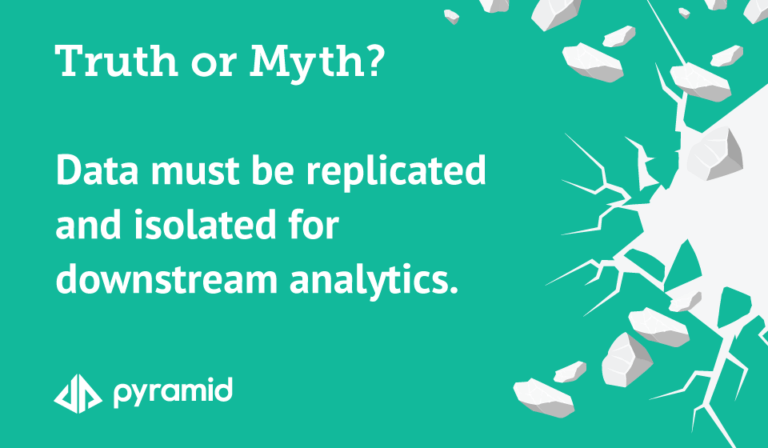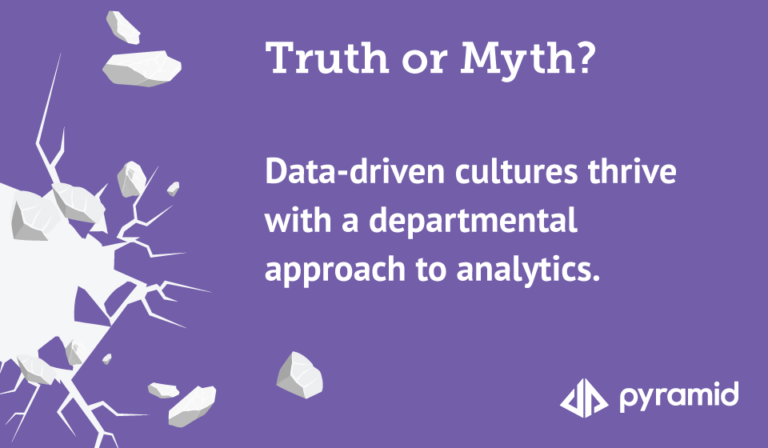When driving a data culture, be careful of the lord that wishes to be at your service.
So you set up your goals to become a data-driven organization and even implemented tools to help you run it and set up your KPIs, but are you still struggling to promote collaboration between functions and departments? Do you spend time in meetings arguing over data points instead of addressing operational issues? Do you have issues implementing data-driven initiatives across the organization?
If so, you might be stuck in the dark ages of “data fiefdoms.” Simply stated, the term represents an organization in which data is siloed on an individual or departmental level. Where one individual exerts organization-wide control over access to data.
If this describes your organization, you’re not alone. While thinking about the concept of data fiefdoms, it occurred to me that the problem of deconstructing data siloes is part of maturing your data culture. When an organization is struggling with a maturing data culture, management meetings often devolve into individuals championing their set of metrics while neglecting to understand what the data they are collecting actually tells them.
Designing and maturing a data culture where collaboration and transparency are possible necessitates breaking down data silos and merging individual fiefdoms into a cohesive kingdom that works intelligently with a unified purpose. The parent article I linked early in the post points out what signs can be present in data fiefdoms; I prefer to frame the discussion around these five principles that can help you overcome the designation entirely:
- Solid Data Governance
- Organizational Data Ownership
- Cross-function, cross-department Collaboration
- Adequate Training
- Valuable Metrics
Applied correctly, these principles will ensure your organization reaps the most reward from its data initiatives.
Governance Vs. Policing
Data fiefdoms can arise when one individual is acting as the “Lord of Data.” Whether through fear of transparency or security concerns, installing an individual who too strictly controls access to data can be disastrous.
Good governance is a way to democratize access to data and for management to guarantee that employees are supplied with data that is up-to-date and reliable, allowing employees the freedom to run their own local initiatives while maintaining a proper overarching organizational approach. If you can guarantee the data your employees are working with is solid, there is little need to police who has access to what data.
Providing adequate training to your Chief Data Officer or Data Analyst is paramount. They need to have the tools to empower data’s usage throughout the organization and understand their role is to promote, not police.
Organizational Data Ownership
I like to frame this concept as a conflict between “Me-BI” and We-BI.”
From the Me-BI perspective, an individual owns the data and analytics on their individual machine. They closely guard both the data and the insights derived from it. It has become “their” data. This is especially a problem with desktop applications that do not support collaborative functions.
From the We-BI perspective, an organization collectively owns and manages its data and analytics. Individuals are free and encouraged to work with the data on their own terms, but transparency is built into the process.
This conflict can largely be settled by selecting technology that promotes collaboration and eschewing solutions where data is siloed on individual machines.
A data dictatorship controlled by the lord of your organization will not promote a proper data culture.
Cross-function, cross-department Collaboration
Most organizations begin data initiatives with an ad hoc implementation siloed in a particular department. This is an understandable approach as it minimizes risk and provides a test case from which they can learn.
The problem surfaces when it is time to expand the data initiative to other departments: the lessons learned do not include how data is going to be shared amongst departments. The real benefits of data come from answering questions like: “How do my marketing efforts effect my sales funnel?” or “How does my production line capacity affect my ability to onboard new customers?”
To answer these questions and promote interdepartmental collaboration, it is important to implement the following:
- A standardized platform/solution
- A wholistic KPI set, and
- A collaboration training program
Essentially, collaboration needs to be center stage when planning a data implementation. The degree to which collaboration is successful is largely contingent on how many technical obstacles to cooperation have been removed.
Adequate Training
Organizations need to realize that they cannot flip a switch and become data-driven based on desire alone. To prevent data from being siloed in the machines of only those who have a natural inclination, everyone who is expected to come into contact with data needs some level of training. Technical and conceptual.
And while everyone needs a basic level of training, it is ideal to choose individual data champions within each department; in other words, train the trainer. These are individuals who should be trained in more advanced analytics as a resource for their peers. They aren’t the “Lord of Data,” but they should be able to help less highly trained colleagues get the most out of your data solutions.
Training is truly an integral part of implementing a data-driven culture that is too often overlooked. If an organization fails to invest resources in making data analytics convenient and manageable for its employees, it should not be surprised if they revert to old habits.
Valuable Metrics
I spoke extensively about best practices for establishing KPIs in a previous post, but it is worth mentioning in this context as well.
If KPIs are not designed to show how changes made within one department affect another, it will be impossible to tell an organization’s story through data. Focusing on department-specific KPIs will only serve to concentrate focus and establish data fiefdoms throughout an organization.
To develop meaningful KPIs that promote collaboration between departments, use data champions that understand your data culture and have the knowledge to highlight KPIs that serve cross-department interests. Meetings where you bring together disparate departments to think about how they can use data to understand their role in an organization as a whole will foster the kind of collaborative thinking necessary for a successful data-driven culture.
Conclusion
Falling into the habits of a data fiefdom will do your data initiatives no favors. Collaboration and holistic thinking are more than just buzzwords when applied to a data-driven culture; they are critical to its success.
Data fiefdoms will not see the benefits that a data-driven culture has to offer. If your organization is exhibiting signs of becoming a data fiefdom, consider how you are approaching the principles I have listed above. You may find that with a renewed focus on data literacy, collaboration, and governance your organization can advance from the dark ages of a data fiefdom.













